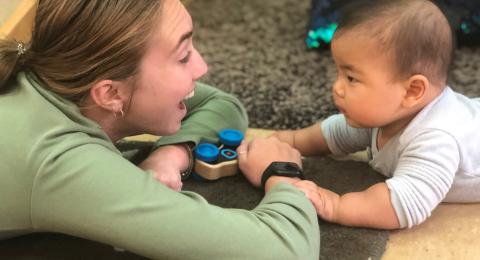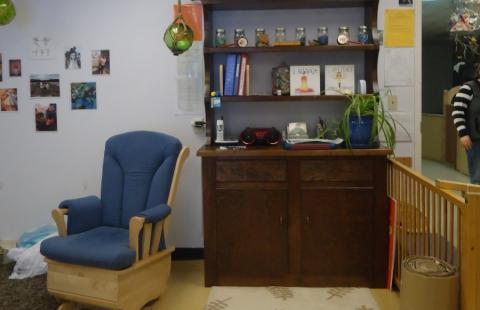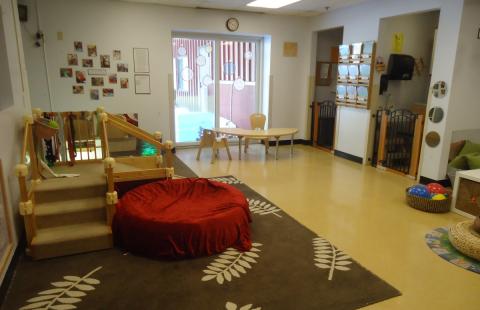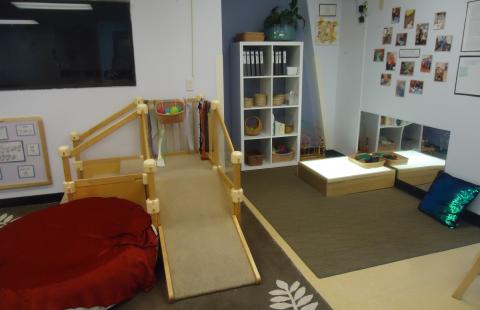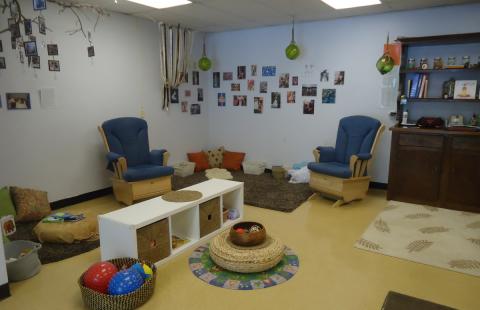Infants/young Toddlers: Ages 6 weeks to typically 17 months at the beginning of the CSDC school year with 3 full-time teachers.
Infant Classroom Family Packet
A Classroom Family Packet will be sent to you in August, containing information from your child’s teachers about the philosophy, schedule, curriculum, and classroom practices of the classroom that builds on to the CSDC Family Handbook.
Classroom Teachers
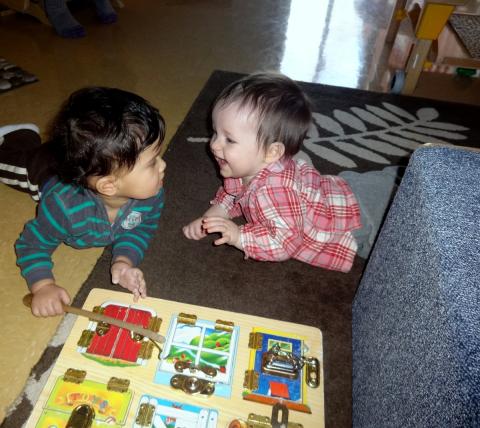
A Glimpse in the Day in the Infant Room
Arrivals (Welcomings):
CSDC opens at 7:30am. We sometimes refer to this time as a welcoming rather than a drop-off time. When you and your child arrive in the morning, we will greet you and ask how your child’s night or weekend was. We ask that you place their beverages and food for the day in the refrigerator in our classroom and fill out their chart, and put their coat and bag in their cubbies in the hallway.
At this age, we are very aware that children may have a difficult time separating from their parents. We are also aware that when parents are indecisive about leaving, it can make separation even more challenging for the child because the child picks up on the parent’s apprehension. We plan to work closely with you on this very sensitive issue and ask that you come in and spend a few minutes with your child in the classroom at arrival times. When it is time for you to leave, tell your child that you are leaving and that you will come back and then leave the room. This sends your child a clear message that you are leaving and you will be back.
At this point, we will assist in comforting your child, if needed, to help him/her through the moment. "Sneaking" out of the room without saying good-bye or without letting your child see you go leaves the child wondering what happened to you and may cause him/her to be confused and upset. By the same token, when a parent starts to leave, comes back, leaves again, comes back again, the child will receive a mixed message about what is actually taking place. If you are feeling uneasy after leaving your child please feel free to observe your child from the observation booth for a few moments to put your mind at ease. You may also stop in the office, call the classroom before you leave the building to check-in. You may also call us at any time and as many times as you need to check in with us about your child. We want to make this transition as stress free as possible for both you and your child and will work together to develop a transition plan.
Because we respect the individuality of each child, we structure the day according to each child’s wants, needs and individual routines and by being sensitive to the cues they gives us. Therefore, the routine in the Infant/Young Toddler Room is subject to change at any given time. We incorporate all developmental domains including motor, communication/language, cognitive, and social-emotional into our daily routines.
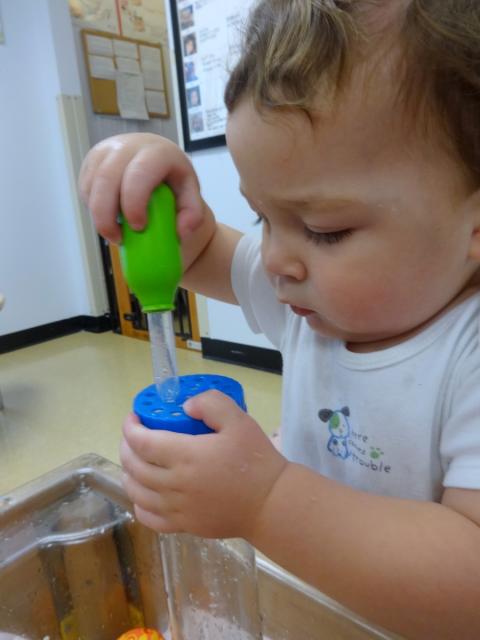
Foundation
We believe that infants and young toddlers develop and thrive best when given a nurturing, loving, and responsive environment, one that promises a commitment to children and supports a variety of learning opportunities where children are free to explore. We strive to create meaningful experiences for children that extend their cognitive, language, physical and socio-emotional development. Since infants and young toddlers have not yet mastered their verbal communication skills, we will use simple sign language with the children to minimize frustration. Infants and young toddlers have not yet mastered their communication skills, making it important for us to ensure a program that develops trust, security, and attachment. By providing these, children become secure and competent in their journey towards autonomy as they gain mastery over their world.
We understand that children develop at different rates and therefore, we provide a curriculum that is based on respect for each child's individual needs, interests, and routines. Infants and young toddlers learn through play. Everything they do is a learning process. Our role is to be a facilitator of this learning process thus we offer an environment rich in challenging and age-appropriate activities.
We view the child as part of a large family context. We encourage parents and siblings to visit the classroom throughout the day. We write monthly newsletters and provide a group parent meeting every six months to help keep families up to date on classroom happenings. We also write assessments of each child in our care and recommend individual family conferences to discuss the development of their child. We also provide other events such as potluck dinners, lectures, field trips, discussion groups, etc. Parents are always encouraged to participate in our activities and to bring their own talents into the classroom.
Framework
We support a respectful learning environment for our infants and young toddlers by being sensitive to each of their needs and by following the children's cues. Infants and young toddlers have very individualized schedules, therefore we plan our curriculum around each child's routine. We provide a variety of materials and activities that reflect the developmental stages of the children. We maintain a flexible environment that is sensitive to the children's preferences, temperament and tolerance levels. We will offer children many opportunities throughout the day to enjoy quiet times. During these times, a teacher may take 2-3 children out for a short stroller ride, onto the deck, etc. This allows teachers and children the opportunity for more one-on-one interaction with fewer distractions. Because we have a varied age range, from infancy through young toddlerhood, we feel it is important to meet the needs of each developmental stage by supplying activities and opportunities that will be challenging to all.
As a part of our program, we offer young toddlers a "linking space" where they join the toddler program for a period of time each day. In this shared space, the two classrooms interact in activities that bring the infant and toddler programs together. Our goal is to help stimulate socialization between the mixed ages. The linking space also provides the infant and toddler teachers more opportunities to interact among themselves and to collaborate on how best to serve both age groups.
Another part of our program is the "looping" process. Each year, when infants and young toddlers transition into the toddler classroom, at least on America teacher will move with the children. The purpose of looping is to provide continuity of care for children and families. As the children further move on into the preschool classroom, the toddler teachers return to the infant classroom and begin the cycle again with a new group of young children.
Intentions
We provide children with a safe, secure environment while encouraging them to explore and make choices. We support their learning experiences by facilitating a child-initiated teacher-guided atmosphere.
Infants are supported in their development of strong attachments to their caregivers and peers. Emphasis is placed on respect for their individual needs and developing skills. We adjust the curriculum to accommodate each child's needs. It is our goal to provide an inviting, supportive atmosphere for all of the children.
